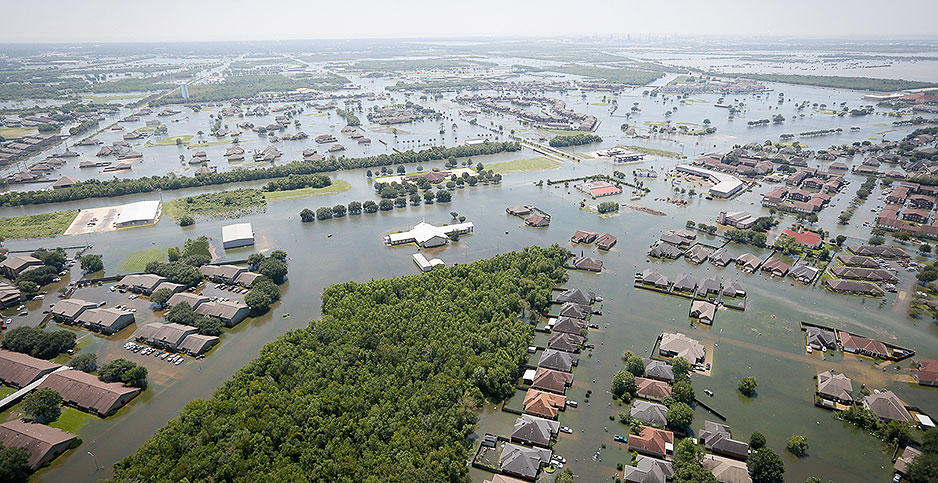
The Federal Housing Administration's mortgage portfolio is "very exposed to flood risk" because a large number of FHA-backed homes are not covered by flood insurance, according to a report by the Department of Housing and Urban Development.
In two flood-prone states — Florida and North Carolina — 73% of the homes with FHA mortgage insurance are located in or near high-risk flood zones. But just 18% have flood insurance, the report finds, raising concerns that major flooding could lead homeowners to default on their mortgages and trigger massive FHA insurance payments.
FHA provides taxpayer-backed insurance to 8 million mortgages with a combined value of $1.3 trillion. There are roughly 500,000 FHA-insured mortgages in Florida and 175,000 in North Carolina.
The report also found that FHA-insured homeowners in those states often flout a federal law that requires them to have flood insurance if they are in a high-risk flood zone and have a federally backed mortgage.
"Only about one-half of homes required to have [flood] insurance are in compliance," the report finds.
HUD analyzed flood-insurance coverage in Florida and North Carolina to assess its financial exposure "as the extent and costs of flood damage increase throughout the United States," the report says.
The report highlights a little-noted risk facing federal taxpayers as climate change intensifies flooding and other disasters. Government Accountability Office reports about climate change and federal fiscal exposure have warned about rising claims on the federal government's National Flood Insurance Program, which provides most of the nation's flood coverage, and on federal crop insurance programs.
But the GAO reports have not mentioned FHA insurance and the potential cost to taxpayers if a large number of homeowners without flood insurance default on FHA-insured mortgages.
The large number of properties without flood insurance "portends a serious systemic risk to the [FHA] portfolio in the context of increasing flood events," Seth Appleton, who was HUD's assistant secretary for policy and development, wrote when the report was released in November. Appleton has left HUD.
The report suggests that HUD and FHA might start to track more closely whether homeowners with FHA-insured mortgages are complying with flood-insurance requirements. The agency conducts "random monitoring of compliance" but does not have access to data from the federal flood insurance program "to routinely conduct analysis across its entire stock" of mortgages, the report says.
"HUD needs more detailed data to regularly conduct audits of compliance with the flood insurance requirement," Appleton wrote.
Perhaps the most alarming finding of the report is the miniscule number of FHA-insured homeowners who have flood insurance, despite living next to high-risk flood zones in Florida and North Carolina.
The federal requirement for flood insurance applies only to people with federally backed mortgages on property that the government says has a 1% chance of being flooded each year. The HUD report found that from 2011 through 2019, roughly half of the FHA-insured properties in Florida and North Carolina complied with the insurance requirement. Compliance rates were slightly higher in Florida than in North Carolina.
But owners of property just outside a so-called special flood hazard area face no flood-insurance requirement even though the properties face a higher-than-average flood risk.
Nearly 400,000 homes in Florida and North Carolina have FHA-insured mortgages and are located within 600 meters of a flood hazard area, the HUD report found. But fewer than 5% of those homes had flood insurance in 2019.
"This portfolio is very exposed to flood risk, yet many homeowners that are at risk are not covered by adequate flood insurance — even when it is required," Appleton, the former HUD official, wrote in his introduction to the report.
The findings about compliance failures with flood-insurance requirements mirrors previous analyses. A study by the Federal Emergency Management Agency in 1999 of flood victims in Vermont found that about half of the people who were required to have flood coverage had such policies. FEMA runs the National Flood Insurance Program.
A GAO study in 1990 found that compliance rates in Maine and Texas were about 64%.
The HUD study comes as FEMA has been urging more homeowners to buy flood insurance even as the agency tries to increase premiums so they better reflect a property's risk to flooding. The National Flood Insurance Program covers 5 million properties.